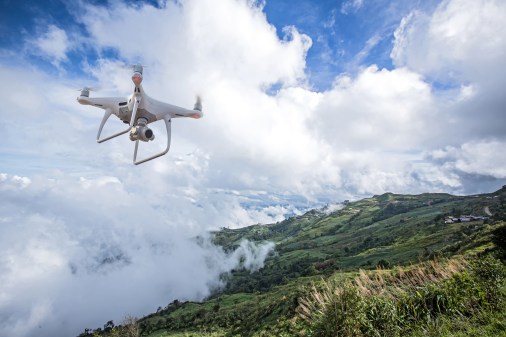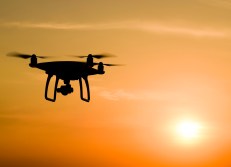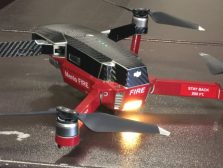Virginia lawmakers look to prohibit drone use in localities

Members of the Virginia General Assembly are not waiting for the Federal Aviation Administration to act on unmanned aircraft systems — they’re moving to stop the use of drones now.
Five separate bills introduced earlier this month to the Virginia House of Delegates and the Virginia State Senate aim to allow local governments to ban individuals from operating small UAS in their communities. Some of the bills also address the use of drones by Virginia public authorities, including state agencies and other government organizations.
For Del. Scott Surovell, the need for legislation on UAS came after two of his constituents became embroiled in a legal dispute after one neighbor’s drone hit another’s house.
“While investigating the situation, I became concerned that Virginia Law was unclear as to the right of a property owner to control their airspace immediately above their property and at least beneath the tree canopy,” Surovell told StateScoop.
In addition to releasing a short bill that would enable localities to regulate the use of privately owned drones through ordinances, Surovell also asked Virginia’s attorney general to issue a legal opinion on the scope of the federal government’s preemption in the drone sphere so that state legislators can achieve clarity on state and local policy.
“I am confident that some minimal level of state regulation is permissible to ensure that, at a minimum, the property rights of homeowners are protected from invasions of privacy,” Surovell said.
Virginia state Sen. Jennifer Wexton introduced a similar bill but added the provision that localities may prohibit the use of privately owned UAS weighing 55 pounds or less. Wexton, however, chose to remove her bill from committee consideration. StateScoop’s requests to Wexton’s office for comment on her rationale behind striking the bill were not returned by publication time.
Del. C. Todd Gilbert and Sen. A. Donald McEachin collaborated to introduce a bill to each of their respective houses to impose a penalty on any person who outfits a drone with a weapon. According to the text of the legislation, the operator or manufacturer of a weaponized drone would be guilty of a class one misdemeanor.
The bill would also prohibit state agencies from disclosing the personal information acquired through the operation of a drone. State agencies, under the bill, would only be able to use UAS if they have a warrant. The only exception to the warrant rule would come for Amber Alerts, Blue Alerts or Senior Alerts, and missing persons exercises. Agencies would also be permitted to operate drones for training exercises for any of these exceptions.
Under the requirements of the bill, agencies looking to procure a drone for official use would need the approval of the Virginia General Assembly. In addition, any state organizations that use drone technology would be required to publicize policies and procedures for drone use and release an annual audit of the practices.
Del. Benjamin Cline’s bill would also create an exception for Amber, Blue and Senior Alerts. Cline’s bill, however, would also include an exception for the Virginia National Guard’s use of UAS during training or any other federally-mandated Defense Department training.
Four of the bills await action in the House of Delegates’ Committee for Courts of Justice’s Subcommittee on Criminal Law. Wexton’s bill originally rested in the state Senate Committee on Local Government, but was rescinded.
Virginia is home to one of the FAA’s six UAS test sites. In August, at the official opening of the test site in Blacksburg, Gov. Terry McAuliffe encouraged the FAA to act on drone integration sooner rather than later.
“I think everyone recognizes with me that patience is not a virtue that will be chiseled into my tombstone, so as fast as we can do it, with meeting the safety concerns that [FAA Administrator Michael Huerta] talked about, I’m fine with it,” McAuliffe said. “This is billions of dollars, thousands of new jobs, and I’m just honored that Virginia is a leader in this.” One report suggests Virginia could see as much as $342 million in economic value over the coming decade from fostering drone development in the state.
Last week, a coalition of 10 media organizations announced it would partner with the Virginia test site to examine how drones can aid the newsgathering process. The announcement came days after CNN announced that it would work with the FAA to do the same.
Brian Wynne, the president and CEO of the Association for Unmanned Vehicle Systems International (AUVSI), said with the partnership between the test site and the media organization, the commonwealth was already seeing the benefits of the technology.
“UAS have a variety of beneficial applications. However, unnecessary and excessive regulations could prevent the realization of these benefits and deny first responders and businesses these beneficial tools,” Wynne told StateScoop in an email statement. “As lawmakers consider UAS legislation, it is our position that manned and unmanned aircraft should be treated the same, focusing laws on the collection, sharing and retention of data rather than the platform doing the collecting.”
Any bill imposing additional restrictions on hobbyist use of drones in certain communities would be in addition to the FAA rules, which prohibit hobbyist use of drones for any commercial purposes. The FAA regulations also prohibit the use of hobbyist UAS outside the line of sight and within five miles of an airport.
The legislative action in Virginia comes as the FAA prepares to release its Notice of Proposed Rulemaking for commercial use of small UAS. After the proposed rules are released, the public will have a specified length of time to comment before the final rules are released.
According to the 2012 FAA Modernization and Reform Act, the agency was required to have rules in place to integrate UAS into the national airspace by the fall 2015. With no NPRM released at this point, hitting that deadline is almost impossible. In fact, late last year, the FAA inspector general weighed in for the second time and reported that the FAA would miss its deadline.
FAA Administrator Michael Huerta said in August he wasn’t as concerned with meeting the deadline as he was with ensuring the safe integration of drones.
“Our focus is ensuring that we can safely integrate unmanned aircraft into the national airspace system,” Huerta said. “We’re well aware of the 2015 mandate, and it’s something that we’re working very hard to meet, but Congress gave us two requirements: to demonstrate integration and to demonstrate that it can be done safely, and that’s our highest priority.”






